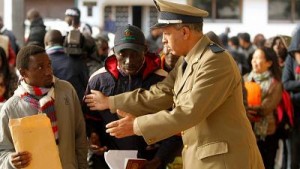Africa News
with Reuters
Morocco launched the second phase of a campaign to ‘regularise’ the status of thousands of undocumented migrants on Thursday. The first phase was launched in 2014. The permits will allow them to work, enroll their children in school and have access to medical care.
The first phase was launched in 2014. More than 23,000 undocumented migrants have been given resident permits in the pat few years, authorities say. Of those, 23 percent were from Syria, 21 percent from Senegal and 19 percent from the Democratic Republic of Congo, the interior ministry said.
The permit allows people to work, enroll their children in school and have access to medical care.
Special offices have been opened in all Moroccan prefectures and provinces to receive the applications from foreigners.
Morocco has long been a transit to Europe, but as European countries have increased border security to check an unprecedented wave of migration, those who could not enter Europe, have put down roots in the country.
The applications for resident permits will be examined by prefectural and provincial committees who will decide which undocumented migrants are entitled to stay.
“There is no time limit for this operation that is open to everyone. All foreigners from every nationality who are staying illegally in Morocco and do not have resident permits have the opportunity now to submit their request in this office and also in all prefectures and provinces in Morocco. These requests will be examined and we will decide later on who are the people who fulfill the criteria and those who don’t,” said Khalil el Kay, the head of security at Rabat prefecture.
The scheme will cover foreigners married to Moroccan nationals, foreigners who are working or living in the country legally, those with five years of continuous residence in Morocco and those who have a chronic disease.
Kamara Gumbo Dimafa is hoping to be second time lucky.
“Today, I came here to apply for a permit. I did it the last time but I was refused a resident permit. I don’t know why I did not get it first time. I asked myself this question and it was probably because I did not have the document of the water board. Otherwise, I have all the proofs. I’ve been now in Morocco for nearly five years. I came to Morocco in 2011,” he said.
A majority of the migrants are from other African countries. But Morocco has also become home to thousands of Syrians who have fled the conflict in their country.
Walid al-Ahmad has been in Morocco only for a month. But he hopes to get the permit, as his mother is ill.
“They tell us that we should be living at least five years here to apply but we have been here only for a month. Yet, one of the criteria for applying is a chronic disease. My mother is chronically ill. She suffers from heart and blood vessels diseases,” he said.
“It is very refreshing because for me, it is not good to roam around Morocco illegally. That’s why I want to be legal in this place. I love Morocco, I love this place. It is good for the Filipinos and for the migrants like me. We are very thankful for the King. He gave us amnesty,” said Kyle Santos, a migrant from The Philippines.
The migrants from Africa, Syria and The Philippines all hope they will be able to get their papers, with some thanking the Moroccan King for giving them ‘amnesty’.








